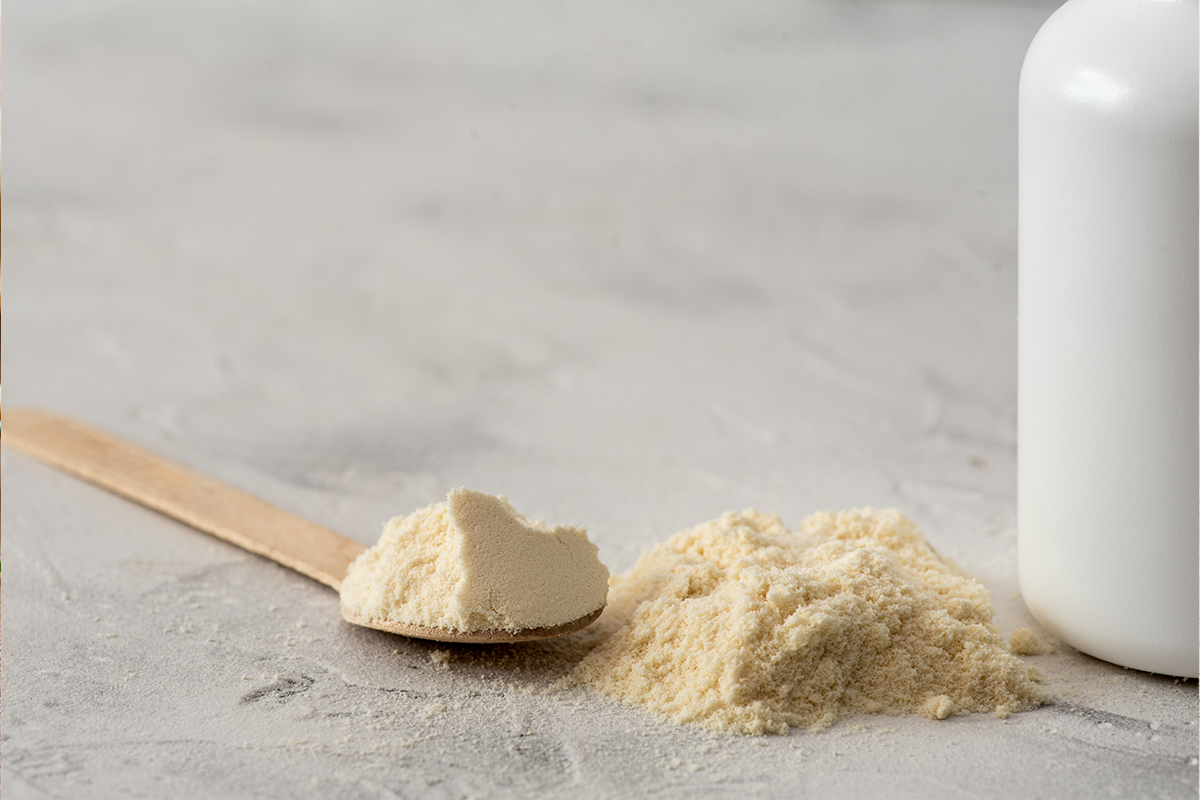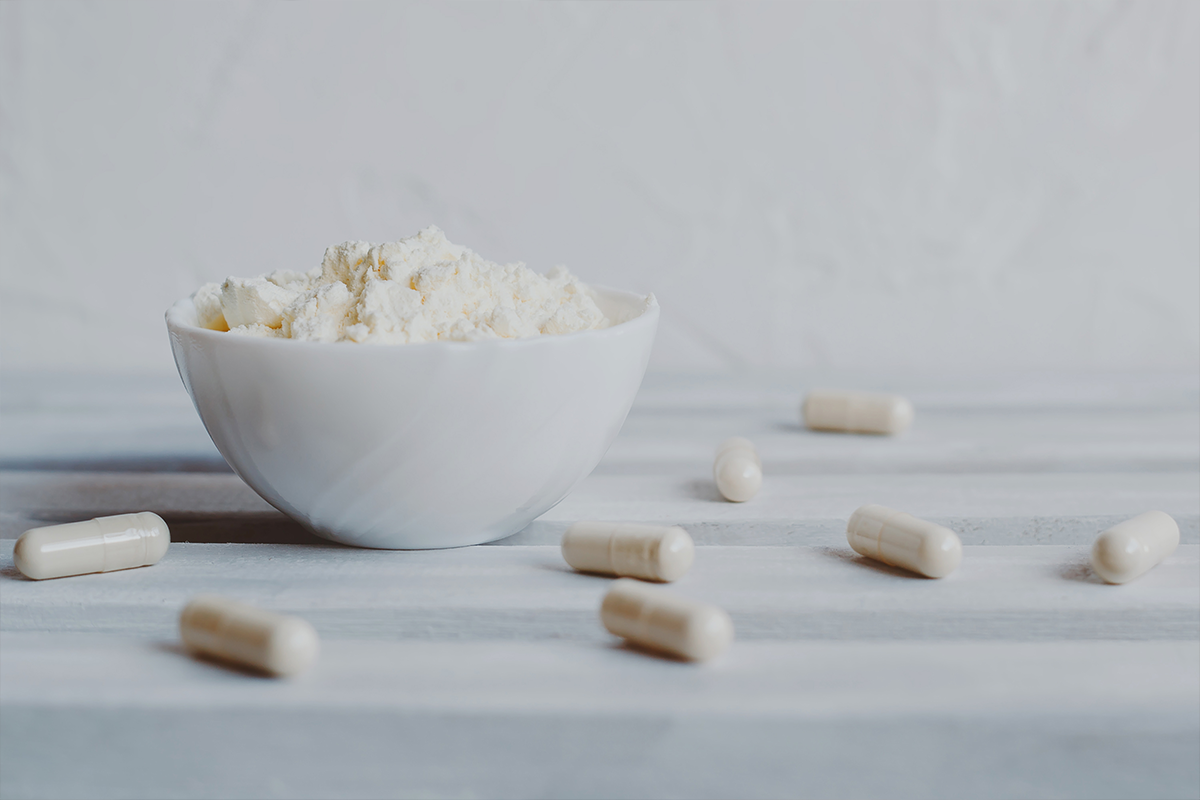Should you add colostrum to your diet? Bovine colostrum is found specifically in the milk cows produce soon after giving birth—so you won’t find it in the milk at your local grocery store. Rich in nutrients that support immune, gut, and muscle function, colostrum is being studied for its potential to benefit many aspects of well-being.
What is colostrum?

You may be most familiar with colostrum as the nourishing first form of breastmilk that newborns receive. It’s full of antibodies, proteins, fats, and vitamins, all of which hint at this superfood’s potential to benefit health. Bovine colostrum typically comes from cows and can be pasteurized and dried to create a nutrient-dense supplement. Compared to everyday cows’ milk, colostrum contains up to 100 times higher levels of antibodies that can strengthen your immune system.
What are the benefits?

Given colostrum’s immune-boosting potential, it’s no wonder research shows that it can help those with upper respiratory illnesses. Colostrum’s powerful combo of proteins and carbohydrates can help with gut health, and studies have focused on its potential to prevent and reduce diarrhea. Researchers are even exploring its potential to speed recovery from exercise, curb cancer cells, and more.
Aids gut health

Colostrum contains important proteins and carbohydrates that contribute to a healthy gut. Casein, a key protein in colostrum, aids in digestion and contains anti-inflammatory and anti-bacterial properties. Similarly, the carbohydrates in colostrum act as a prebiotic, aiding in gut health. Research involving participants such as ICU patients and athletes have shown that colostrum supplementation reduces intestinal permeability. Increased intestinal permeability interferes with nutrient absorption and protection from external factors, causing inflammation in the gut.
Boosts immunity

Colostrum is an important part of building up newborn calves’ immunity—and could help support your immune health too. Vitamin D is present in high quantities and plays an integral role in immunity, promoting calcium and phosphorus absorption. The antibodies present in colostrum neutralize bacteria and viruses in calves, and research is exploring its potential to prevent several viruses in humans as well.
Many colostrum studies focus on athletes because intense training can compromise the immune system. A 2019 study on high-intensity athletes found that supplementing with colostrum increased lymphocytes, a type of white blood cell that’s important to the immune response.
Strengthens bones

Colostrum has been shown to be helpful for older adults. In one study, older adults consumed either colostrum or whey protein. It was found that a marker of bone loss was diminished and leg-press strength increased in the colostrum group compared to the whey protein group. Colostrum also contains vitamin D, which is crucial for healthy bones.
Promotes faster recovery from exercise

There’s a reason that you may have heard about colostrum in tandem with athletes—not only can colostrum help with strength, but it has also been shown to improve recovery. A 2017 study with soccer players demonstrated improved recovery after supplementing with bovine colostrum. If you’re a high-intensity fitness fan, colostrum could be a powerful tool to help you repair and recover after workouts.
Curbs upper respiratory illness

Plenty of research has demonstrated colostrum’s effectiveness in preventing upper airway infections. In a 2016 study, children afflicted with recurrent upper respiratory tract infections were given bovine colostrum powder for four weeks. Following this period of supplementation, issues related to the recurrent ailment, such as total infections and episodes of diarrhea, were significantly decreased.
Eases diarrhea

Given the gut health benefits of colostrum, it should come as no surprise that the supplement has the ability to prevent and decrease diarrhea. Colostrum’s potential to reduce intestinal permeability can be helpful for those experiencing diarrhea. Although researchers have not been able to pinpoint why exactly this supplement helps with diarrhea, they believe it has to do with colostrum’s high levels of proteins and antibodies.
Fights cancer cells

Anti-cancer components in colostrum show great promise and are the subject of ongoing research. Lactoferrin is a protein in colostrum that helps prevent certain types of cancer by strengthening immune function. Depending on the type of cancer, lactoferrin can assist the immune system by altering the cell membrane or inhibiting the spread of cancer. Milk fats present in colostrum also have anti-cancer properties.
How should you take it?

Many colostrum studies have participants taking bovine colostrum in a dried form, either as a powder or pill. Similar to collagen powder, colostrum powder is often tasteless and easy to combine with water, coffee, or a smoothie. As with any new supplement, be sure to talk with your health care practitioner or the knowledgeable staff at your local health food store to make sure colostrum is right for you.



